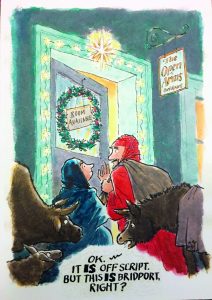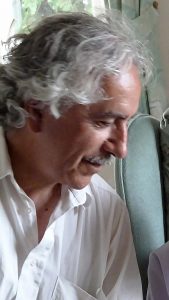December 2021
When the Bridport Refugee Support Campaign got in touch to tell us about their 2021 Christmas card (pictured), we couldn’t resist taking the chance to find out more about the local artist behind its creation…
I meet Claudio Muñoz at his home in the Dorset countryside, a mile or two off the coast road to the east of Bridport. As he welcomes me inside, the tranquillity of the warm kitchen – where the cat lazes in a rare patch of November sunshine and huge greyhound Alfie stretches his long legs in the corner – suggests that this is a creative house, and it is. This is the home of not one but two artists.
sunshine and huge greyhound Alfie stretches his long legs in the corner – suggests that this is a creative house, and it is. This is the home of not one but two artists.
Claudio lives in this traditional longhouse with his wife, painter Jill Newsome, who is at work in her studio at the bottom of the garden. Born in Chile, Claudio left to escape the violent coup of 1973 and settled in London in 1978 after meeting Jill. She is, he says, his “favourite thing about England.”
It sounds like the couple are the perfect foil for each other. “Our friends say that she’s the Latin American one, and I’m actually from Kent,” he says. “I’m shy, reserved – although Jill says I’m not. I’m always reluctant to go out, but then I’m always reluctant to leave a party at the end of the evening because I’m so deep in conversation.”
They met when Jill was teaching and they were both involved with the Siloists, a group of young humanists who were disillusioned with both mainstream politics and the “hippy, gassy” alternative. They were in the Canary Islands for a Siloist gathering when one day Claudio heard Jill struggling to communicate in Spanish and went over to translate for her. Their relationship began, although initially Claudio was travelling around Europe, trying to work out where he should live.
“I knew my prospects in Chile were nil – the artists there were exiled, jailed or dead – so I’d looked at France, Spain, Italy, and then went to London to visit Jill. On the last day that my ticket was valid I knew I’d have to decide. We said goodbye that morning – she went to work and I stayed at her house – and I found a copy of the I Ching, the book of divination, which is supposed to help you make difficult decisions. I did the thing with the three coins, and looked up the answer: time to cross the oceans. I took that to mean that I should stay in London, to leave my birthplace an ocean away.”
Claudio and Jill have been together ever since. They had two daughters (he has a son from his previous marriage) and eventually moved to West Dorset.
Art becomes political
 Claudio trained in architecture but left college to concentrate on art, working first in graphic design and creating drawings for an educational publisher. For many years he has produced editorial illustrations for the national press, most notably the Economist. Much of his work is fiercely political and he is not afraid to call out corruption or caricature world leaders.
Claudio trained in architecture but left college to concentrate on art, working first in graphic design and creating drawings for an educational publisher. For many years he has produced editorial illustrations for the national press, most notably the Economist. Much of his work is fiercely political and he is not afraid to call out corruption or caricature world leaders.
He cites illustrators Gustav Doré and Mario Silva Ossa (‘Coré’) as early influences, but what about more recent work? “Ai Weiwei is so inspiring,” he says. “I went to his exhibition at the Royal Academy some years ago and was very impressed. He filmed so courageously after the 2008 earthquake [in Sichuan], proving that the buildings had been put up shoddily and that many people died because of it. It’s a repeated story: money comes first, whatever the cost, and that cost is people’s lives. It was the same in Istanbul after the 1999 earthquake – the main cause of death was shoddy building.
“There’s a conjunction between politics and art – art becomes political by the making of it, when it moves beyond entertainment, when we artists display ourselves as witnesses.”
Alongside this work, Claudio is also an illustrator of children’s books, often collaborating with authors such as Henrietta Branford and Gill Capper as well as with Jill. In 1997 he won the French Prix du Livre de la Mer for Le Petit Capitaine (The Little Captain). He’s currently hoping to work with a Chilean publisher on his next book, about a father taking his little boy back to Chile from exile, and says it will touch on some of the things the people of his homeland suffered in the years after the coup.
“I’m proud that I’ve been able to make a nice living in this way – particularly collaborating with Jill – and that my work has been recognised in the Americas. My last book for a US publisher is still paying royalties, while so many books sink without a trace.”
Drawn to the water
Before leaving I ask Claudio what he misses about his homeland, that skinny country to the west of Argentina. Chile has a long coastline and is dominated by the ocean, so it’s no surprise that Claudio has chosen to make his home here in Dorset. He stresses that he wanted to live near the sea, rather than beside it, although he says in stormy weather they can hear the turbulent water from their house. Isn’t the English Channel rather different from the Pacific, though?
“I miss the ocean,” he says, “but the sea here does have a bit of the same wildness. Sometimes it looks calm but it’s actually heaving, almost like the water is breathing, and it’s very frightening. In Chile it can be absolutely deadly – it sweeps the beach and claws back, taking everything with it. I once had to grab my daughter to save her from the sea on a visit back there. I miss the mountains and rivers of Chile, too, but the country has changed; there’s such bad pollution now. Chile exports a lot of paper, and the centre is covered with pine and eucalyptus plantations. The soil is so acidic, and whole villages have gone.
“Of course the mountains are still there: they seem eternal, but even they are not, there’s some kind of cycle always turning in the universe. Nationality is a thin, dangerous construction that we attach ourselves to in detriment to other concepts. I believe at some point we’ll have to throw this concept away and weave a new pattern of understanding if we’re to continue living on this planet.”
www.claudiomunoz.com